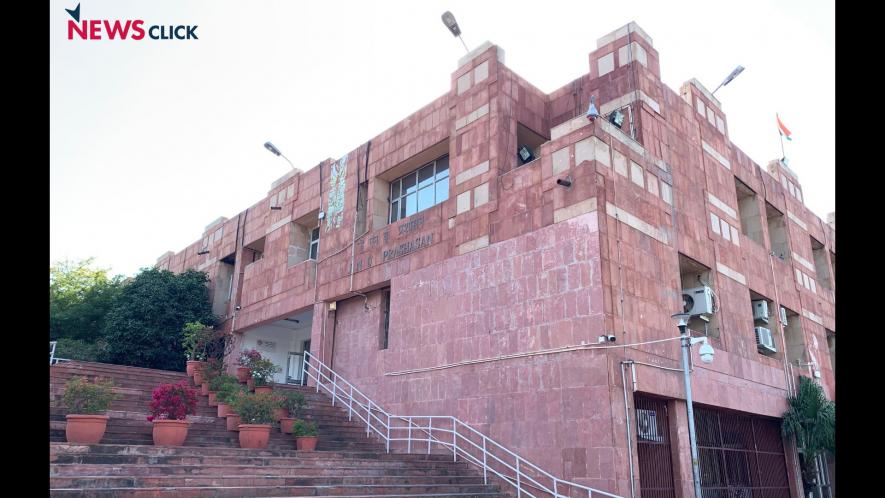No Hostel for First-Year JNU Students, Indefinite Strike in Protest

Students who aspire to be the country’s best researchers, scientists and administrators are homeless and without food in the heart of the national capital. The students at Delhi’s Jawaharlal Nehru University (JNU) are on an indefinite dharna outside the office of the Dean of Students demanding hostel accommodation, which they have not got even after five months of admissions. The students maintain that the accommodation crisis in premier research universities has triggered anxiety among them over studies and future prospects.
Akash Kumar, a student hailing from West Champaran district in Bihar and enrolled in BA (Pashto), said that the first-year students decided to gherao or encircle the office of the Dean of Students till it comes up with the allocation list for students. Talking to NewsClick over the phone, he said that the crisis has pushed parents to arrange funds for their wards through debt, a highly unusual phenomenon in a university like JNU.
“My father has small farms and a footwear shop for income. He hardly earns more than Rs 2 lakh per annum. Since the university has not come up with lists, I have to ask for money from him. Munirka remains one of the most expensive areas for living in Delhi. It seems that my education is making him poorer,” Kumar said.
He added that the students are roaming from one hostel to another for food. Since we are not hostel residents, mess supervisors will not prepare food for us. Any non-resident who wishes to eat at the hostel mess must get a coupon. However, these coupons will be only considered once all residents have eaten. “We had to sleep hungry sometimes. Another option is to go to Dhabas, but it is expensive too.” he said.
He added that the current scenario compromised the women students’ privacy and security as well. The list for first-year undergraduate women students has not been released since November 28 last year. “They have been given a dormitory as a temporary measure, but they have no privacy. Many of these women are living outside the university. Parents who are sending their daughters have assurance about the security inside the campus. If something bad happens to any of these students, who will take responsibility?” Kumar said.
Another student enrolled in MA Economics who requested anonymity said that he has to shift his base every week as he is still waiting for a hostel room. “I am from Ayodhya and new to the campus. I had to request seniors if they could allow me to stay in their rooms. Many times seniors asked me to vacate because their roommate was back on campus. When you have four students in the room, how will you study? A consistent fear looms in your head if you are repeatedly asked to vacate the room. I have seen students sleeping in reading rooms because they have no rooms,” the post-graduate student said.
When asked about economic hardships in getting a room outside campus, he said, “It is very difficult. My father runs a grocery shop. So, he cannot afford this burden. I will have to ask my brothers for help now,” he said.
Gopika, a student of MA Sociology who led the protests at the DoS office, told NewsClick that the administration opted for a crude approach to the crisis as it released a list of 20 students, who are men, for rooms. However, there is a waiting list of 450 students who are men. She said that the students feel anxious as it profoundly hurts their studies.
She further said, “The library rooms are full as UPSC aspirants always occupy them. So, the next best option to study remains the hostel rooms. But how to study when your dormitory is shared by 50 other students? The students who were staying with friends in Shipra hostel were awakened at 2 AM by the hostel warden without any intimation and fines were imposed on them.” The warden argued that they were illegal occupants, but she failed to acknowledge the administration’s failure in allocating rooms, Gopika said, adding, “These are bonafide students of JNU and they are certainly not illegal residents.”
The situation is so grim that students are not getting food coupons, and they cannot buy food either. “How would students cope with the pressure that they would attend the 9 AM class, prepare assignments and still remain homeless?” she asked.
Aishe Ghosh, President of the Jawaharlal Nehru University Students Union (JNUSU), said that the administration has not been able to come up with a concrete plan to accommodate first-year students. Despite several reminders, the Dean of Students is still clueless about the opening of the newly constructed Barak Hostel. She said, “The students are holding a dharna outside the office. Some students even slept under the sky at night to portray their precarious situation. Yet, the administration has not come up with a solution. Instead, it has chosen to penalise first-year students who were staying with their friends in the absence of the allocation of hostels. It is unjust, and the fines should be revoked immediately.”
Ghosh said that the university hardly has the capacity to accommodate half the enrolled students. Against the enrolment of 10,000 students, the hostels can accommodate only 5,500 students. “We have been seeing the construction of Barak Hostel for many years now. It has just been completed, and its opening can relieve the students from economic and mental distress. I know several first-year students who are sharing cramped rooms in Munirka to avoid this pressure. It’s one of the universities where students are still coming from mofussil towns and villages from Bihar, Jharkhand, Chhattisgarh and Odisha. We cannot expect these students to spend money on accommodation and food,” she said.
The hopes from new Vice Chancellor Santishree Pandit, who boasted her links with the university and the first woman VC in its history, have been dashed, the JNUSU President said. “The university has failed to prioritise the necessary things. It is spending money on conferences hosted and addressed by functionaries of the RSS. Why can’t it understand that students want shelter first? It has to pursue the University Grants Commission and other bodies for more grants. It cannot go to the Higher Education Funding Agency for more loans to build infrastructure. In return, it will have to increase the students’ fees,” she added.
NewsClick tried to reach the Dean of Students, Sudheer Pratap Singh, through e-mail but did not receive a response at the time of the publication of this story.
Get the latest reports & analysis with people's perspective on Protests, movements & deep analytical videos, discussions of the current affairs in your Telegram app. Subscribe to NewsClick's Telegram channel & get Real-Time updates on stories, as they get published on our website.
























